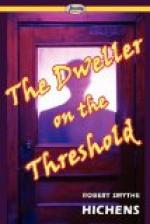And for a moment he forgot his aim in remembering himself. Afterward, in thinking matters over, he offered a pinch of incense at the altar of his egoism.
“So, the modern clergyman still believes in slip-slop, does he?” he exclaimed in his most aggressive manner. “Even now hasn’t he learnt the value of the matter-of-fact? The clergyman is the doctor of the soul, isn’t he? And the doctor, isn’t he the clergyman of the body? I wonder, I do wonder, how long the average doctor would keep together his practice if he worked with no more precision than the average clergyman. The contempt of the pencil and note-book! The contempt of proper care in getting together and coordinating facts! The contempt of proof—the appeal to reason! And so we get to the contempt of reason. And let me tell you—” he struck the tea-table with his lean hand till the curate’s cups jumped—“that scarcely ever have I heard a sermon in which was not to be found somewhere the preacher’s contempt for reason, the bread of the intellect of man.”
“The soul is not the intellect.”
“Don’t you think it higher?”
“I do.”
“And so you put it on slops!”
The professor got up from his chair, and began to sidle up and down the small room.
“You put it on slops, as if it were a thing with a disordered stomach. That’s your way of showing it respect. You approach the shrine with an offering of water gruel. Now look ye here!”—The professor paused beside the tea-table—“The soul wants its bread, depends upon it, as much as the body, and the church that is free with the loaves is the church to get a real hold on real men. Flummery is no good to anybody. Rhetoric’s no good to anybody. Claptrap and slipslop only make heads swim and stomachs turn. The pencil and note-book, observation and the taking down of it, these bring knowledge to the doors of men. And when you sneer at them, you sneer at bread, on the eating of which—or its equivalent, basis-nourishment—life depends.”
“I wonder whether you, and such as you, really know on what the true life of the soul depends,” said Chichester, with an almost dreadful quietness.
The professor sat down again.
“Such as I?” he said. “You are good enough to do me the honor of putting me in a class?”
“As you have so far honored me,” returned Chichester.
“Ha!” ejaculated Stepton.
He had quite got the better of his egoism, but he by no means regretted his outburst.
“Do you claim to stand outside the ranks of the clergy?” he asked.
“Do you claim to stand outside the ranks of the scientists?”
“Oh, dear, no. And now—you?”
Chichester said nothing for a moment. Then, lifting up his head, and gazing at the professor with a sort of sternness of determination, he said:
“Remember this! You yourself told me that in a crowd of a thousand you must have fixed your attention on me.”




